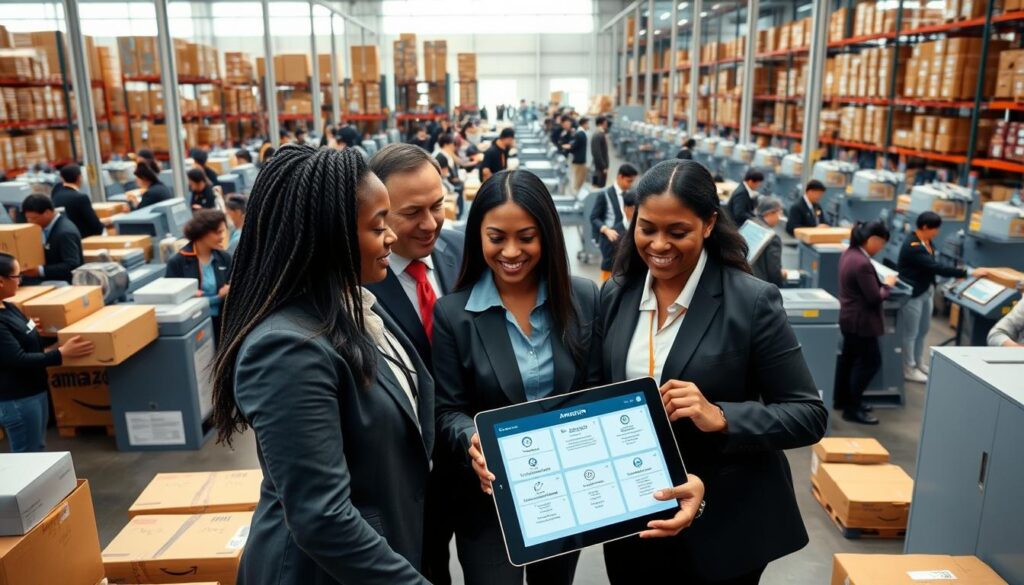Anúncios
Nearly 20% of the workforce will work remotely by 2025. This is a big change for businesses. Remote work technology has made it easier for teams to work together, no matter where they are.
Mobile work tools have played a big role in this change. They offer features like tracking time, managing projects, and team collaboration. These mobile apps are making remote work better and more flexible. They are shaping the future of remote work.
Key Takeaways
- The rise of remote work is driving the demand for mobile work tools.
- Mobile apps are enhancing team collaboration and productivity.
- The use of remote work technology is expected to continue growing.
- Companies are adopting mobile clock-in/clock-out applications to manage remote teams.
- The future of remote work is closely tied to advancements in mobile technology.
Seamless Communication in Remote Work Environments
Seamless communication is key to successful remote work. Mobile apps have made it easier. Now, remote collaboration software solutions help teams work together well.
Apps like Slack, Microsoft Teams, and Zoom change how teams collaborate. Slack, for example, lets teams chat and share files in real-time. It creates a digital workspace that’s both flexible and strong.
These digital workspace solutions help remote teams work better, no matter where they are. They offer instant messaging, video calls, and file sharing. These features close the gap between team members.
Anúncios
Let’s look at how these tools compare:
| Platform | Key Features | User Experience |
|---|---|---|
| Slack | Instant messaging, file sharing, integrations | User-friendly interface, highly customizable |
| Microsoft Teams | Video conferencing, file sharing, integration with Microsoft Office | Seamless integration with Microsoft products, robust feature set |
| Zoom | Video conferencing, screen sharing, virtual meetings | High-quality video, easy to use |
For more on communication tools for remote teams, check out Hub Engage. They offer great tips on improving team collaboration.
In summary, virtual office apps are changing how remote teams talk and work together. These tools help businesses create more united and productive remote work spaces.
Enhanced Project Management Tools
Mobile apps are changing how we manage projects by offering tools for remote work.
Mobile apps are now key for project management because they boost team work and productivity. Task assignment, progress tracking, and real-time communication are key features. They make these apps essential for teams working from afar.
Using mobile apps for project management brings many benefits. Here are a few:
- They help manage tasks better with clear assignments and tracking.
- They make team work better with tools for real-time chat.
- They help teams work more efficiently from anywhere.
Apps like Trello and Asana are favorites among remote teams. They offer important project management tools and work well with other apps. This makes workflow smooth.
Adding mobile work tools to daily work has changed project management. These tools help teams finish projects well, even when working from home.
As remote work technology keeps getting better, we’ll see new ways to manage projects. The future of work will depend on mobile apps. They will play a big role in making teams more productive and collaborative.
The Importance of Mobile Accessibility
Mobile accessibility is now a must in the remote work era. It shapes the future of digital workspace solutions.
With more people working from anywhere, it’s key to have access to tools and info. Mobile devices are vital for remote work. They help employees stay in touch and manage tasks well.
The role of mobile accessibility is huge in several areas:
- Enhanced flexibility and productivity
- Improved collaboration among remote teams
- Increased accessibility for employees with disabilities
- Better work-life balance
Here’s some data on how mobile accessibility affects remote work:
| Aspect | Benefit | Impact on Remote Work |
|---|---|---|
| Flexibility | Work from anywhere | Increased productivity |
| Collaboration | Real-time communication | Enhanced team cohesion |
| Accessibility | Inclusive work environment | Better employee satisfaction |
To learn more about mobile devices and digital transformation, check out Onfra’s blog on mobile devices.
Advancements in Security and Privacy
Remote work is becoming more common, and strong security measures are vital. Mobile apps are key in making remote work safer and more private.
Mobile app security has improved a lot. Now, they use advanced encryption to keep data safe. This means data sent between the app and the server stays protected from hackers.
Mobile apps also use two-factor authentication and safe data storage. Two-factor authentication adds an extra step to log in. It might ask for a code sent to your phone or a biometric scan.
Secure data storage keeps important info safe on your device. This lowers the chance of data leaks. These security measures are essential for remote work technology. They let employees work safely from anywhere.
With these advanced security features, mobile apps greatly improve data protection for remote workers. This protects sensitive information and makes remote work environments secure and trustworthy.
AI and Automation in Mobile Apps
Mobile apps are using AI to offer personalized experiences. This helps make remote work more productive. AI makes sure employees get the right info and tools they need.
AI personalization in mobile apps makes work smoother and faster. For example, AI guesses what tools and info a user might need based on their past actions and likes.
This personal touch can really help. It can make work more efficient and save time. Key benefits of AI-driven personalization include:
- Enhanced user experience
- Increased productivity
- Better decision-making through relevant data
To show how AI personalization works, let’s look at a comparison:
| Feature | Without AI Personalization | With AI Personalization |
|---|---|---|
| Information Access | Generic, one-size-fits-all approach | Tailored to individual user needs |
| User Experience | May require more time to find relevant tools | Streamlined and intuitive |
| Productivity | Potentially lower due to inefficiencies | Enhanced through relevant tool access |
In conclusion, AI and automation in mobile apps are changing remote work. They offer personalized and efficient work experiences. As this tech gets better, we’ll see even more ways to make remote work better.
Customization and User Experience
Remote work is changing fast, and customization and user experience in mobile apps are key. Mobile apps now offer customization options. This lets employees make the app fit their needs, boosting productivity and job happiness.
Modern mobile apps let you create personalized dashboards. These dashboards help employees focus on what they need most. For example, a sales team can see customer info, sales numbers, and goals all in one spot.
Mobile apps also let you set up customizable workflows. This means you can make the app fit your work style. It’s easier to manage tasks and work with your team.
Customization in mobile apps has many benefits. Some key ones are:
- More productivity with streamlined workflows and tasks
- A better user experience with personalized features
- Being able to adapt to changing work needs
To learn more about making great mobile apps for remote work, check out this guide on custom mobile app development. It offers insights on creating apps that meet the needs of remote workers.
Best Practices for Implementing Customization
When adding customization to mobile apps, follow best practices for a smooth user experience. This includes:
- Doing thorough user research to know what your audience wants
- Designing easy-to-use interfaces for customization
- Offering clear help and support for using customization features
By focusing on user experience and offering strong digital workspace solutions, companies can help their remote teams work better. As remote work technology keeps improving, mobile apps will play an even bigger role in the future of work.
Mobile App Integration with Existing Tools
Mobile apps are changing remote work by linking up with remote collaboration software. This lets employees use many tools and get information from one place.
This connection is key for better work. It makes workflows smoother and boosts productivity. With mobile apps and mobile work tools together, teams can work from anywhere, anytime.
There are many good things about linking mobile apps with tools. For example, project management software can be added to mobile apps. This lets teams see progress, give tasks, and work together live. Also, customer relationship management systems can be used through mobile apps. This helps sales teams keep up with customer talks and sales.
Some main benefits of mobile app integration are:
- Workflows get better, making work more productive
- Team members can work better together
- Employees have more freedom to work from anywhere
- They can get to all the information and tools they need from one place
Using digital workspace solutions helps businesses create a unified work space for remote work. This makes employees happier and helps the business grow.
Future Trends in Mobile Remote Work Applications
Mobile remote work apps are on the verge of a big change. New technologies are shaping the future of remote work. They promise to make it more efficient, flexible, and secure.
Emerging Technologies in Remote Work
Technologies like Artificial Intelligence (AI), blockchain, and the Internet of Things (IoT) are changing remote work. AI helps with routine tasks, improves teamwork, and offers personalized experiences.
Blockchain technology boosts security and transparency in remote work. It makes data sharing and verification safe and clear. IoT connects devices, giving real-time data and insights.
| Technology | Application in Remote Work | Benefits |
|---|---|---|
| AI | Automation, Collaboration Tools | Increased Efficiency, Personalized Experience |
| Blockchain | Secure Data Sharing, Verification | Enhanced Security, Transparency |
| IoT | Real-time Data, Device Connectivity | Improved Remote Work Experience |
These technologies will change mobile remote work apps. As they grow, remote work will become more common, flexible, and efficient.
Future Remote Work Trends
The future of remote work is bright. Trends like more mobile work tools, better security, and personalized experiences are coming. With technology advancing, remote work will become a bigger part of our lives.
Conclusion: The Future of Work in a Mobile World
Mobile technology is changing how we work remotely. It makes work more efficient, flexible, and secure. Mobile apps give employees the tools they need to work from anywhere.
The future of remote work depends on better mobile tools. These tools help teams work better together, no matter where they are. They make work more productive and flexible.
Mobile tech will be key in the future of remote work. By using these advancements, companies can stay ahead in a fast-changing world.



